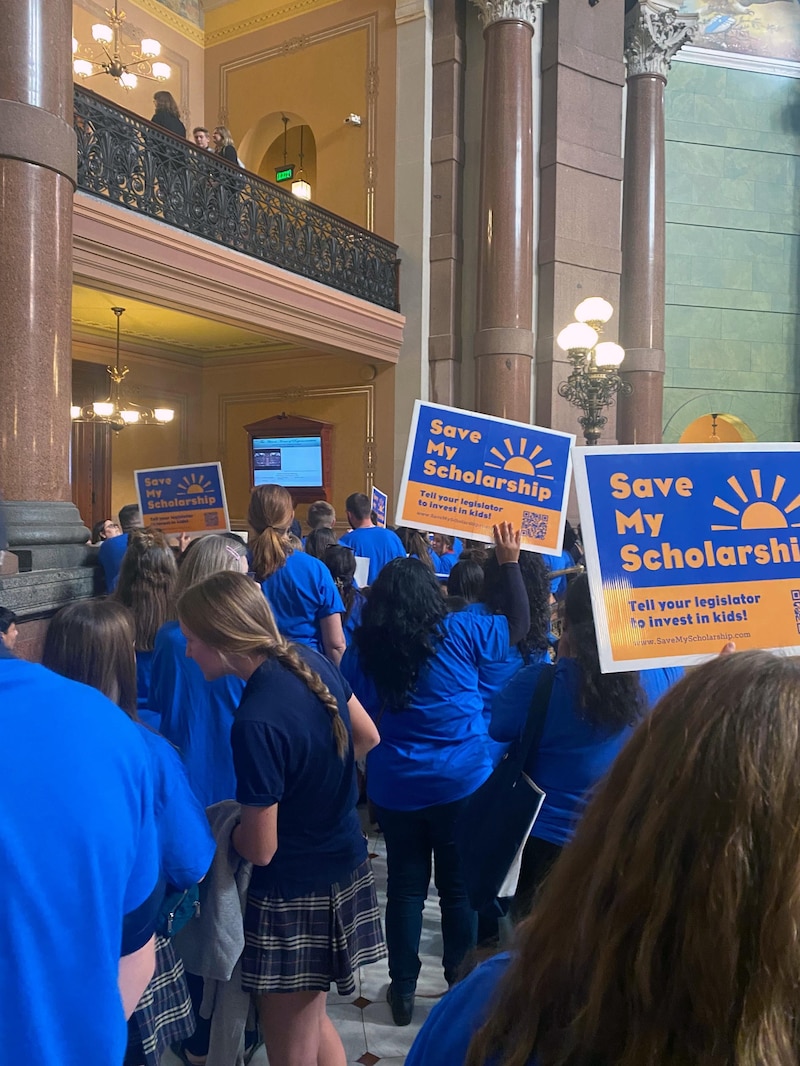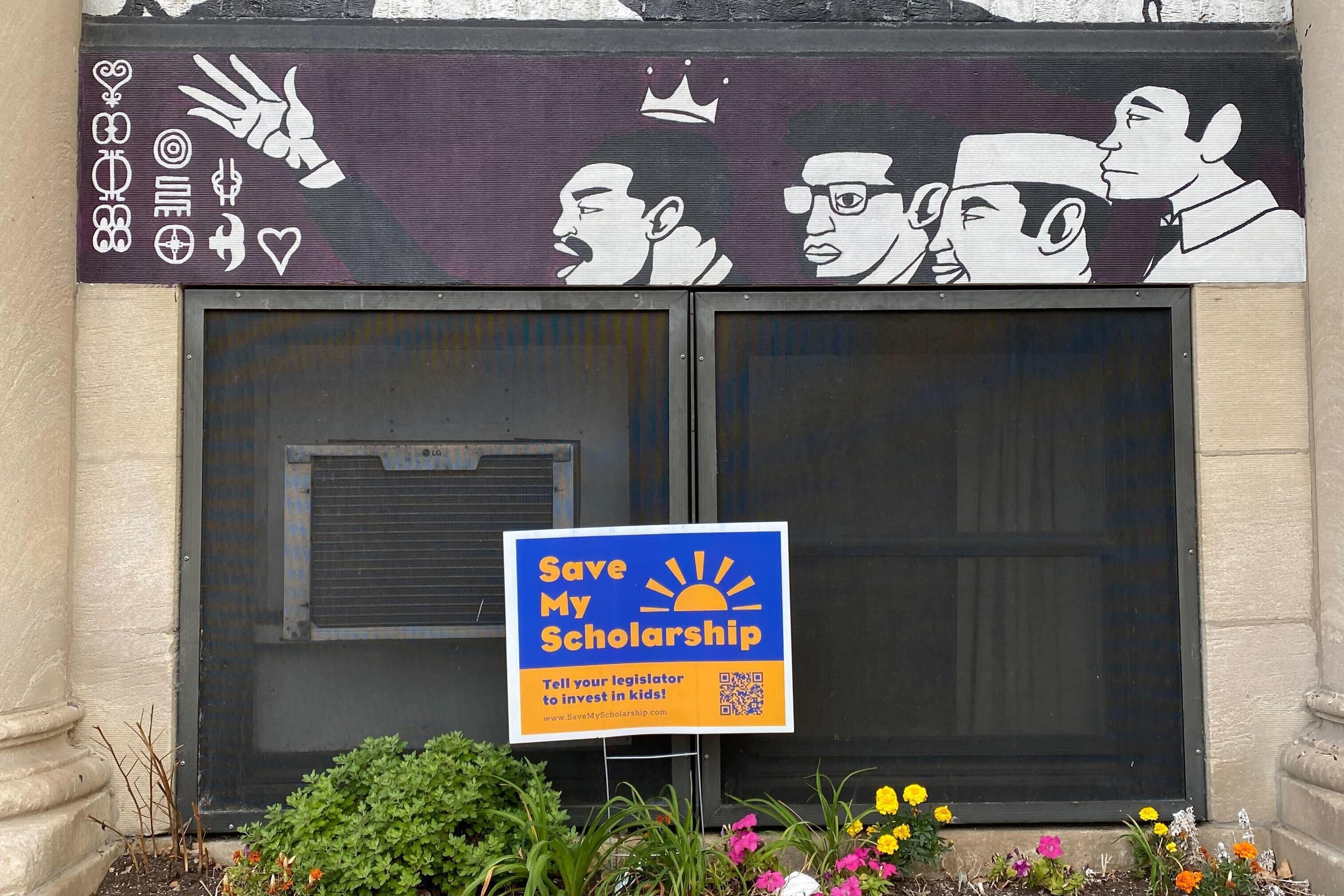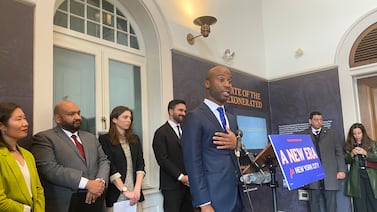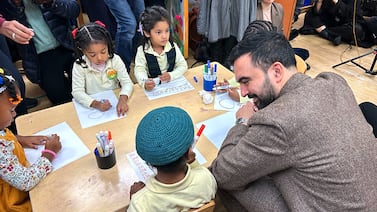A little over three years ago, Eva Villalobos was searching for a public school for her four daughters, two of whom she had recently adopted in March 2020.
She wanted a school that would provide the mental health and academic support her new daughters needed. Then she discovered St. Gall School on the city’s Southwest side. It had everything she was looking for: small class sizes, before- and after-school child care, and social emotional support.
The price tag for the Catholic school was steep — Villalobos said it cost her almost $20,000 a year for all four children. But her oldest daughter received funding from Illinois’ tax-credit scholarship, Invest in Kids, to bring the price down to about $10,000 a year.
Next school year, however, Villalobos’ children — and more than 9,000 other Illinois students who received tuition support this year through Invest in Kids — will no longer benefit from the state-sponsored financial help.
That’s because Illinois lawmakers are letting the tax-credit scholarship program lapse on Dec. 31. Students who already receive the tax credit scholarship will have their tuition paid for through the end of this school year.
Illinois’ move comes at a time when more than a dozen states across the country have created new private school choice programs or expanded existing ones.
Neighboring red states, such as Iowa and Indiana, have recently made nearly all of their students eligible for private school choice programs, which give families public dollars to pay for private educational options. Wisconsin, which has a Democratic governor and a Republican-dominated legislature, increased the dollar amount of its school vouchers over the summer.
But in Illinois, state lawmakers did not pass a bill during the fall veto session to extend the program despite a last-minute push from families and advocacy groups. Democratic Gov. J.B. Pritzker struck a neutral position that frustrated both sides — underscoring the shifting political winds in a state that has become more blue since the program passed six years ago.
Invest in Kids allows individuals or corporations to donate to scholarship-granting organizations that then distribute money to students from low-income families who need help paying tuition for private schools. Donors get a tax credit worth 75 cents for every dollar donated, up to $1 million. The state capped donations at $100 million and credits at $75 million — limits that were never hit, according to state data.
Michael Petrilli, president of the right-leaning Fordham Institute, said Illinois is likely the first state to kill an existing private school choice program without court intervention.
“It’s very hard to take government benefits away from people, especially when they are sympathetic individuals, especially low-income parents trying to do right by their kids,” Petrilli noted.
But opponents of private school choice programs applauded Illinois lawmakers for not extending the program when the veto session closed last Thursday evening.
Dan Montgomery, president of the Illinois Federation of Teachers, one of the state’s largest teachers unions, said in a press release that “there is a nationwide push to divert public dollars from our public schools through vouchers or voucher-like programs like tax credit scholarships and education savings accounts.”
He praised Illinois lawmakers who “chose to put our public schools first.”
For Villalobos, the end of the program likely means taking her children out of a school where they are thriving.
“We would be forced to try to find different ways to still be able to support them because they need all this additional help,” she said, noting that she doesn’t see how paying for private school would be feasible. “It just won’t happen.”
How politics shifted during Invest in Kids’ existence
Last week, Villalobos and other families and supporters of Invest in Kids filled the halls of the state capitol in Springfield for the final days of the fall veto session. Wearing blue shirts that read “Save My Scholarship,” they pushed state lawmakers to call a bill, HB 4149, that would extend the program until 2029 with some new limitations around donations.
But Illinois Speaker of the House Emanuel “Chris” Welch never called the bill for a vote.
The moment stood in stark contrast to 2017, when Republicans and Democrats were engaged in a tense, drawn-out battle over how to pay for public education. A budget impasse had stretched for two years.
At the time, Republican Gov. Bruce Rauner favored the idea of tax-credit scholarships and said he was “hopeful” a compromise deal would include such a program. Democratic leaders — all of whom are no longer in office — wanted a compromise to end the stalemate and better fund public schools. Behind the scenes, they were open to including a tax-credit scholarship.
Invest in Kids emerged from the closed-door negotiations that finally broke the impasse.
State lawmakers agreed in 2021 to extend the program for a year, with the backing of trade unions that supported additional money for the creation of private vocational schools. Those unions offered their support again this year.
Some advocates, who hoped for another extension, became concerned in the spring when Brandon Johnson, a former middle school teacher and organizer with the Chicago Teachers Union, became mayor of Chicago. Johnson beat Democrat Paul Vallas, a former CEO of Chicago Public Schools, who favored school vouchers and charter schools.
“His victory surprised a lot of people,” said Greg Richmond, superintendent of the Archdiocese of Chicago Catholic Schools. “I had a friend who works in the political arena, he called me two days after the mayoral election and he said, ‘I hope I’m wrong, but I’m just letting you know the scholarship program is now dead.’”
The perception was that “elected officials would want to be on the right side of the CTU,” he added.
Still, in October, Pritzker said he would sign a bill if lawmakers sent it to him. A spokesperson from the governor’s office told Chalkbeat Chicago in late October, “he won’t veto something that passed with a majority supporting it.”
Republican lawmakers urged Welch to bring the bill to a vote on the House floor last week and expressed deep frustration that he didn’t do so.
Rep. William Hauter, a Republican representing a district in central Illinois between Peoria and Springfield, mocked his colleagues from the floor Thursday. “I stand to just congratulate the majority power party who has stood firmly against the Invest in Kids program.”
He called Democrats’ commitment to kill the program “breathtaking.”
In a veto session, a bill requires three-fifths vote to pass. Cassie Creswell, executive director and president of Illinois Families for Public Schools, a public education advocacy group, said Welch might not have wanted to call the bill because it didn’t have enough support from Democratic lawmakers.
“He does not want to call bills that are going to divide his caucus,” she said.
Opponents celebrate ‘historic win’
When the veto session ended on Thursday, opponents cheered the end of Invest in Kids. They said the program lacked transparency and accountability when it came to reporting who received public dollars, and it gave public money to religious schools that discriminate against LGBTQ students.
Public schools have to report academic and disciplinary data to the Illinois State Board of Education, which is included annually in the state’s report card. Similar data for Invest in Kids is not available, though students enrolled in private schools with the help of a tax-credit scholarship are required to take state standardized tests.
“We do not know test scores. We don’t know graduation rates. We don’t know discipline information. We don’t know who attends,” said Creswell. “We don’t know how anyone spent $250 million they got over these last five years. So no transparency and no oversight.”
The Illinois Department of Revenue has issued an annual report on Invest in Kids for the past five years. But much of the individual school level data is suppressed because of student privacy laws. Aggregate data collected in the most recent annual report showed 56% of students supported by tax-credit scholarships last school year were white, 32% were Hispanic or Latino, 20% were Black, and 12.5% identified as other.
Roughly two-thirds were from families whose income was below 185% of the federal poverty line — or $49,025 for a family of four in the 2022-23 school year.
Rep. Angelica Guerrero-Cuellar, a Democrat and the lead sponsor of HB 4149, said she hopes to bring new legislation in the spring.
Guerrero-Cuellar, who represents neighborhoods on the city’s southwest side and west suburbs, said more than 400 students in her district use the tax-credit scholarship to attend private schools.
“This is a critical and needed program for a lot of people,” she said. “We have food deserts, health deserts, and educational deserts.”
But some supporters of the program think a last-minute save is unlikely after lawmakers declined to act last spring and then again in the veto session.
Anthony Holter, president of Empower Illinois, one of the largest scholarship-granting organizations for the program, said he doesn’t know how “feasible it is and whether the conditions in the spring would be any different.”

Supporters worry about the future for scholarship students
Some supporters of Invest in Kids worry about the long term-effects on students and schools when the tax-credit scholarship program ends.
Tracy Smith, a mother of twin boys whose tuition is supported with the help of a tax-credit scholarship, said that without an extension, private schools could close and teachers could be laid off from their jobs. She also said that ending Invest in Kids would take away families’ right to choose a school that is right for their kids.
“You’re going to have an influx of more students going into a system that they don’t want to be a part of,” said Smith. “If they don’t extend the program, you’re taking away their choice.”
Richmond, superintendent of schools for the Archdiocese of Chicago, said some Catholic schools could face closure without the scholarship program.
“Some of our schools have 50 kids on scholarship or more,” he said. “When a school loses that number of students then the school’s future is also at risk. It’s not just the 50 students whose education is at risk.”
Some donors have already reached out about helping students stay in their schools, he said.
Christine Boyd, principal of St. Mary of the Lake and St. Thomas of Canterbury Catholic schools on the North Side of Chicago, said the vast majority of the schools’ 300 students were on scholarship. Most of the students are African immigrants who speak two languages at home, she said, and the school has a “robust” program for English language learners.
The loss of the scholarship program “will be very devastating to our community and to the school,” Boyd said.
Roni Facen, principal at St. Francis de Sales High School on the city’s Southeast Side, said that she has 55 students who are a part of Invest in Kids. She said some of the students won’t be able to continue attending the school.
The school is located in a predominantly Black and Latino neighborhood and many families are low-income, she said. Facen said that the school gives a scholarship to all students to help them attend.
“I’m gonna do everything I know how to do to keep my babies here. But it doesn’t mean that it’s going to be an easy fight,” said Facen.
Villalobos, the mother of four, was angry when lawmakers waited until the last minute to make a decision on the scholarship and disappointed that the program was not extended.
“There’s so many unforeseen things that happen in life. No matter how financially stable or healthy you are, things can change in the blink of an eye,” said Villalobos. “This is such a wonderful cushion to have for hard times.”
Now she’s trying to figure out her next step. She wants to keep her daughters at St. Gall, which offers before- and after-school care and social-emotional and academic support. But now that Invest in Kids is ending, she doesn’t know what she’ll do.
Becky Vevea contributed reporting.
Samantha Smylie is the state education reporter for Chalkbeat Chicago covering school districts across the state, legislation, special education and the state board of education. Contact Samantha at ssmylie@chalkbeat.org.
Cara Fitzpatrick is a story editor at Chalkbeat. Contact Cara at cfitzpatrick@chalkbeat.org.






